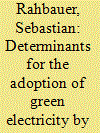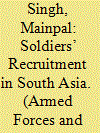|
|
|
Sort Order |
|
|
|
Items / Page
|
|
|
|
|
|
|
| Srl | Item |
| 1 |
ID:
162329


|
|
|
|
|
| Summary/Abstract |
In Germany, the substitution of green electricity (GE) from renewable energy sources for nuclear and fossil electricity is politically intended, yet the demand for GE remains limited. This article provides empirical insight into factors influencing the decision of German small- and medium-sized enterprises (SMEs) to adopt GE. Potentially relevant factors are identified through a review of the previous literature and investigated using logit model analyses based on a large-scale survey of German SMEs regarding GE adoption.
|
|
|
|
|
|
|
|
|
|
|
|
|
|
|
|
| 2 |
ID:
101323


|
|
|
|
|
| Publication |
2010.
|
| Summary/Abstract |
The United States Army recently implemented a policy aimed at quelling a large-scale exodus of captains. This policy included the provision of a Menu of Incentives Program targeting officers in year groups 1999-2005. This study details the captain attrition problem, evaluates literature regarding retention options, analyzes the efficacy of the Army's interventions by branch and by year group, and draws conclusions regarding future incentives. Methods used include chi-square and odds ratios analysis. Results reflect high acceptance rates for year groups 1999-2003; however, officers in these year groups may have remained in the service without any additional incentives because they were logically beyond the initial decision point. Findings suggest that seniority, skill, and adequate incentive pay are important considerations for future incentive programs.
|
|
|
|
|
|
|
|
|
|
|
|
|
|
|
|
| 3 |
ID:
164387


|
|
|
|
|
| Summary/Abstract |
This paper explores the predictors of HIV/AIDS awareness and knowledge among older and younger Ghanaian women of reproductive age. Logistic regression was estimated using the 2014 Ghana Demographic and Health Survey data. Results indicate that older Ghanaian women are significantly different from their younger counterparts in terms of the selected socio-economic and demographic characteristics that influence awareness and knowledge of the epidemic. In all, the respondents’ age, region of residence, wealth status, education, marital status and religious affiliation were found to significantly predict knowledge and awareness of HIV/AIDS among women. In addition, pregnancy status and place of residence proved to be significant correlates of HIV/AIDS awareness among Ghanaian women. The study suggests that higher social status is critical in determining whether women of reproductive age are aware of and knowledgeable about the epidemic. Thus, there is the need for policies and interventions to target messages taking into account the varied socio-economic and demographic backgrounds of women in Ghana. Further, health education interventions should be sensitive to the changing technological landscape in order to develop messages that can be delivered via mobile phones, whether as reminders or ringtones, and therefore enhance health knowledge and promote behaviour that brings about desirable health outcomes.
|
|
|
|
|
|
|
|
|
|
|
|
|
|
|
|
| 4 |
ID:
186840


|
|
|
|
|
| Summary/Abstract |
There are inadequate empirical studies on non-farm livelihood choices of rural households in the state of West Bengal, India. This study aims to explore the determinants that effect the choice of households to engage in non-farm economic activities. The present study found that non-farm livelihood diversification factors are more heterogeneous and mainly depend on households’ strategic decisions. A household’s choice of non-farm livelihood activity is determined by binary aspects opportunity-driven versus distress-driven, but it is a complex transformation phenomenon. It has been noticed that within the non-farm livelihoods, share of wage labour (38.3%) is higher, followed by non-farm businesses (19.8%), service providers (18.0%), and salaried jobs (3.4%). The location and distance to the town from the households, food insecurity, and agricultural land size are more influential and statistically significant factors in choosing non-farm livelihood practices. The Mahatma Gandhi National Rural Employment Guarantee Act (MGNREGA) has negatively impacted rural non-farm livelihood activities. There is an 18% and 39% probability of reducing non-farm business and services compared to the increasing MGNREGA work opportunities. Moreover, the likelihood of non-farm business choices has increased by 56% due to rainfall and temperature-change-induced disasters.
|
|
|
|
|
|
|
|
|
|
|
|
|
|
|
|
| 5 |
ID:
094811


|
|
|
|
|
| Publication |
2010.
|
| Summary/Abstract |
Under the compensation system of the U.S. Armed Forces, members who are married or have dependents receive higher rates of pay and greater benefits than those who are single with no dependents. This article examines the hypothesis that these compensation policies induce earlier marriage by active-duty military members compared to otherwise similar civilians who have not served on active duty. Using a logistic regression model on American Community Survey data, the authors estimate the effect of active-duty military service on the probability of being married for twenty-three- to twenty-five-year-olds. Controlling for other factors affecting marriage rates, the authors find that the odds of being married were about three times greater for those with military service compared to similar civilians who have not served. For persons ever married, the probability of divorce is significantly greater for those who have served two or more years on active duty.
|
|
|
|
|
|
|
|
|
|
|
|
|
|
|
|
| 6 |
ID:
166390


|
|
|
|
|
| Summary/Abstract |
Geospatial modelling is extensively used to identify suitable sites for the installation of onshore wind turbines, with the starting point being the estimate of exploitable resource. However, there are concerns that such approaches do not accurately consider the social issues surrounding such projects, resulting in large numbers of projects subsequently being rejected at the planning permission stage. Using the location of 1721 historic wind turbine planning applications in Great Britain, this paper explores whether the planning success of proposed wind turbine projects can be better predicted using a range of geospatial, social and political parameters. The results indicate that the size of the project, local demographics and the proximity to existing wind turbines are key influences affecting planning approval. The paper demonstrates that quantitatively linking local social and political data enhances the prediction of the planning outcome of wind turbine proposals, and highlights that geospatial parameters are necessary but in isolation, not sufficient for assessing the suitability of potential sites. These results also suggest that national policy is restricting the development of onshore wind energy in regions which appear generally supportive of wind energy.
|
|
|
|
|
|
|
|
|
|
|
|
|
|
|
|
| 7 |
ID:
114030


|
|
|
|
|
| Publication |
2012.
|
| Summary/Abstract |
The current military assignment policy of United States prohibits the assignment of females to billets with high risk of combat exposure. As part of an Army review of this policy, the authors analyzed deployment and promotion risk for combat medics. The effect of current policy on male deployment and female promotion risk was unknown. In light of other countries' policies and current operational considerations, senior military leaders sought to understand the effects of existing policy on a low-density, high-value occupational specialty, the combat medic. The authors found evidence that male medics deployed 2.07 times more frequently than female medics. The authors also found evidence that senior male medics (staff sergeants) deployed even more frequently (3.65-1) than their female counterparts. Perhaps as a result, the male combat medics experience higher likelihood of promotion from staff sergeant (E-6) to the rank of sergeant first class (E-7); however, the magnitude of that benefit was about one-third of the deployment risk. The results confirm the existence of gender-based deployment risk and promotion disparity. Based upon this analysis, the authors recommended the deprecation of current gender coding for combat medics to the senior levels of the US Army.
|
|
|
|
|
|
|
|
|
|
|
|
|
|
|
|
| 8 |
ID:
155823


|
|
|
|
|
| Summary/Abstract |
This study uses a survey to examine the propensity of Indian Gujarati youth to enlist in the Army. The predictors were organized in three categories of demographic, individual characteristics of personality, routine and behavior, and socioeconomic and cultural aspects to measure their impact on the intention to enlist. The relationship between son’s intent to enlist and the father’s intent to allow the son’s enlistment was tested by logistic regression. The results of the study showed that non-Gujarati domiciles of Gujarat and the higher number of people working in the industrial plants had positive effect on enlistment propensity, whereas location of a factory near their residence had negative effect on the intention to enlist. Members of National Cadet Corps and those who did not have a family role model showed a positive intention to enlist.
|
|
|
|
|
|
|
|
|
|
|
|
|
|
|
|
|
|
|
|
|